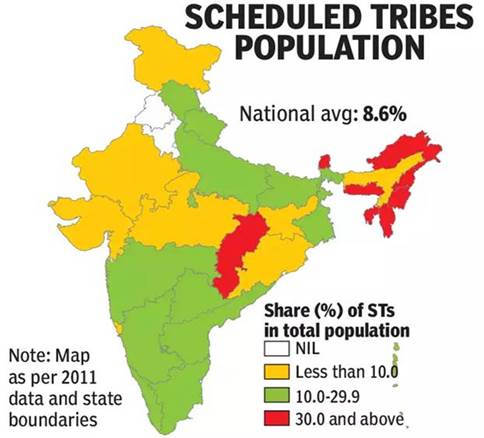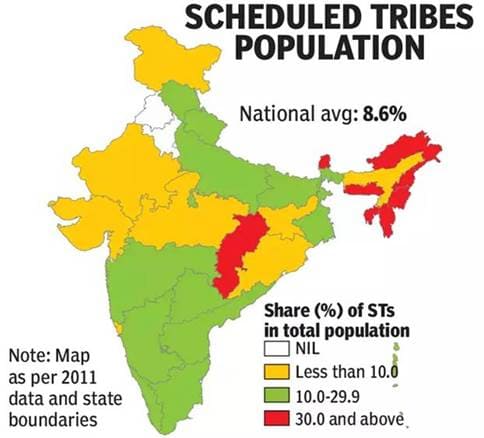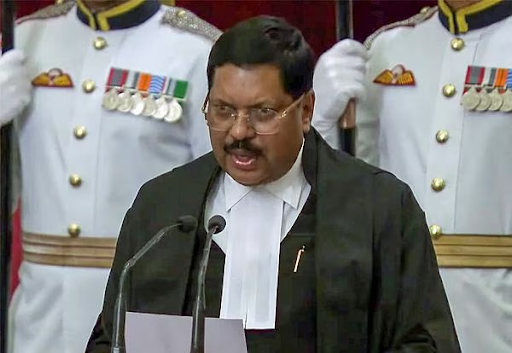Description

Copyright infringement not intended
In News
- Recently the Parliament of India passed three Constitution (Scheduled Tribes) Order (Amendment) Bill, 2022;
- Constitution (Scheduled Castes and Scheduled Tribes) Order (Second Amendment) Bill, 2022 for Uttar Pradesh.
- Constitution (Scheduled Tribes) Order (Second Amendment) Bill, 2022 for Tamil Nadu.
- Constitution (Scheduled Tribes) Order (Fourth Amendment) Bill, 2022 for Karnataka.
Details
- The Constitution (Scheduled Tribes) Order (Second Amendment) Bill, 2022, for Tamil Nadu was passed.
- It will include the Narikoravan and Kurivikkaran communities in the list of Scheduled Tribes in Tamil Nadu.
- The Constitution (Scheduled Tribes) Order (Fourth Amendment) Bill, 2022, for Karnataka was passed.
- It Bill will include Betta-Kuruba as a synonym for the Kadu Kuruba community in the list of Scheduled Tribes in Karnataka.
- The Constitution (Scheduled Castes and Scheduled Tribes) Order (Second Amendment) Bill, 2022 for Uttar Pradesh was passed.
- The Bill will include the transfer of the Gond community from the list of SCs to STs and the inclusion of Dhuria, Nayak, Ojha, Pathari and Rajgond in the list of STs of Uttar Pradesh.
.jpg)
Narikoravan and Kurivikkaran hill tribes of Tamil Nadu.
- The Narikuravar is an indigenous community in Tamil Nadu.
- The main occupation of the people is hunting, but as they were prohibited entry into the forests, they were forced to take up other alternatives such as selling beaded ornaments to survive.
- They migrate from place to place to find a market for their beads.
- Children follow the adults wherever they go, which means they never get to attend school.
- During British rule, they were placed under the Criminal Tribes Act of 1871 and hence stigmatized for a long time. However, they were denotified in 1952, but the stigma continues.
- Their original name is Kuruvikkaran or Nakkale or Akkibikki but wrongly named Narikurava.
- They speak the unclassified Indo-Aryan language called Vaagri Booli.
- Almost all Narikuravas are well-versed in Tamil.
- Although all they come under one roof based on their common clan they were broadly sub-divided into two sub-divisions: the buffalo-sacrificers and goat-sacrificers.
Betta-Kuruba tribe
- The Betta Kuruba tribe lives in the hilly regions of Karnataka and is one of the few indigenous communities of the Nilgiris.
- They belong to the Hindu caste native to the Indian states of Karnataka, Tamil Nadu, Andhra Pradesh and Telangana.
- Traditionally, the Kuruba people drew sustenance from hunting, gathering and collecting wild honey.
- They practised sheep/goat and cattle pastoralism, in that they either herded exclusively sheep, or a mixed herd of sheep and goats, or cattle.
- They are generally believed to be the descendants of the Pallavas.
- Consanguineous marriages like cross-cousin marriages are preferred among the Kurumbas.
The Process of adding a community to the ST List
- The process of adding tribes to the ST list starts with a recommendation from the State governments.
- It is sent to the Tribal Affairs Ministry, which reviews and sends them to the Registrar General of India, Under the Home Ministry for approval.
- After approval, it is sent to the National Commission for Scheduled Tribes and then sent to the Cabinet for a final decision.
- Once the cabinet finalizes it, then it introduces a bill in the parliament to amend the Constitution (Scheduled Castes) Order, 1950, and the Constitution (Scheduled Tribes) Order, 1950.
- After the amendment bill is passed by both the Lok Sabha and Rajya Sabha, the President’s office takes the final decision under Articles 341 and 342 of the Constitution:
- The criterion followed for the specification of a community, as scheduled tribes are;
- Indications of primitive traits.
- Distinctive culture.
- Geographical isolation.
- The shyness of contact with the community at large.
-
- The above criterion is not mentioned in the Indian Constitution. It comes from the definitions contained in the 1931 Census, the reports of the first Backward Classes Commission 1955, on Revision of SC/ST lists (Lokur Committee) 1965.

https://pib.gov.in/PressReleasePage.aspx?PRID=1886889
https://t.me/+hJqMV1O0se03Njk9














